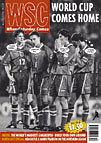 Cris Freddi takes a look at 'unique' goalkeepers
Cris Freddi takes a look at 'unique' goalkeepers
Leslie Henderson Skene, who kept goal for Scotland in 1904, was a specialist in mental disorders. What a nugget to dig up. Let the rest of the article write itself, one case history after another.
Take Elias Owen (Wales 1884), who committed suicide because he was worried about his exams; or George Raikes (England 1896) who gave up football to become a vicar; or Paolo Conti (Italy 1977-79) who was born on April Fools Day. Take Bob Wills-Roberts, who insisted on playing for Wales against England in 1897 with his arms in splints up to the elbows. Like Skene, he was a doctor. Wales lost 4–0.
Some got the ‘eccentric’ tag for nothing more than naff practical jokes (Frank Swift, Sepp Maier); or sartorial gimmicks (Campos, Knudsen of the Faroes); or just for rushing around a bit and being crap on crosses (Tomaszewski, Jongbloed of Holland, Quiroga of Peru). Others have been the real thing, even if you can’t always explain why you think so (Grobbelaar, Ravelli).
Meanwhile, some have been demonstrably one finger short of a full glove. Harry Rennie’s pre-match routine, for instance, included diving around the concrete floor of the changing room “just to harden myself up”. He survived to win 13 caps for Scotland (1900-08). Talking of the unlucky number, Dick Pym (England 1925-26) refused to travel if the numbers on his train ticket added up to thirteen and admitted carrying a lump of coal in his pocket at all times. When he broke his arm in one match it had something to do with a piece of monkey’s fur. Probably better not to ask.
By common consensus the maddest of the early hatters seems to have been Dickie Roose who snapped various pieces of his skeleton during 24 matches for Wales (1900-11) and ended his claims for match expenses with “Use of toilet. Twice, two pence.”
Another manic amateur was James Frederick Mitchell variously described as “a dervish” and “speculative and spectacular”, which was probably a pun: he seems to have been the only keeper to be capped by England (1924) or to play in an FA Cup final (1922) while wearing glasses. Julien Darui (France 1939-51) was good enough to be picked for the Rest of Europe against Britain in 1947. Before the match, he fortified himself with several glasses of wine, each containing as many as twenty lumps of sugar. The Rest lost 6–1.
The streak of barminess surfaces in some unlikely places: Alex Stepney dislocating his jaw by shouting at his defence; Neville Southall staging a half-time sit-in on the pitch; Chris Woods missing an England match after cutting his finger with the penknife he was brandishing in the vicinity of his waistband.
Oddest man out there recently? Higuita comes close (the scorpion kick at Wembley, the cock-up against Milla, the free-kick lessons in prison), but we’ll give the palm to Harry Gregg. He’d come looking for us if we didn’t. His heroics in the 1958 World Cup included winning a heading duel with Uwe Seeler without taking off his cap, which added to the store of anecdotes. Getting through one match on morphine and a quick drag from a Woodbine; nearly drowning while trying to save a team mate; flattening a supporter at Luton because, “I am afflicted with the true Irish temperament.”
But even scarier than Gregg, perhaps the only really unique footballer, was William Henry Foulke, he of twenty-stone fame, of the shorts which could accommodate a fullback in each leg, of the habit of depositing opposition strikers head-down in the mud: “I made a toffee apple out of him.”
This is all well documented, but wee Willie wasn’t just a freak by today’s standards: he was a one-off in his own era too (there were no other twenty-stone nutters keeping goal) – and he was good, witness the FA Cup winners medals and the England cap (1897). Mind you, the abiding memory is more corporeal than that: after he’d conceded an offside goal in the 1902 final, many were visibly moved by the sight of WH Foulke, naked and implacable, roaming the corridors in search of the referee.
The certifiable No 1, then – though you can’t help having a soft spot for WS Jones, who kept goal for Wales against England in 1899. Kept it well, too, despite the 9–1 scoreline; newspaper reports mention his bravery and shot-stopping preventing an even heavier defeat. It took a few years to discover that a ‘W’ had been added to the christian names of Sam Jones, capped six times from 1893 – so ‘Bill’ Jones didn’t exist. The first fantasy footballer was a goalkeeper.
From WSC 121 March 1997. What was happening this month